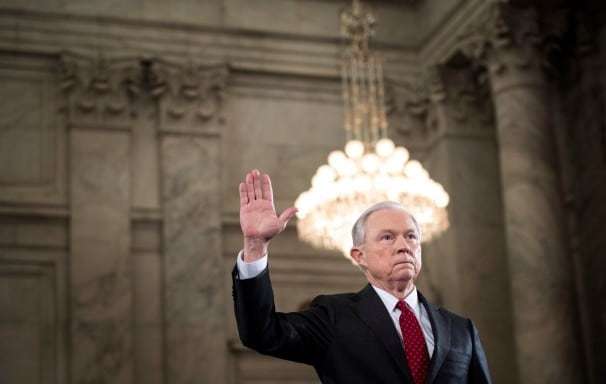The Volokh Conspiracy
Mostly law professors | Sometimes contrarian | Often libertarian | Always independent
The Senate should 'just say no' to Jeff Sessions

Over 1,200 of my fellow law professors recently signed a petition urging the Senate to reject President-elect Donald Trump's nomination of Jeff Sessions to become attorney general. Critics correctly point out that the vast majority of the signatories are liberal Democrats, and (less correctly) therefore dismiss the statement as mere partisan politics. I am not a liberal Democrat, I did not sign the statement, and I don't agree with all of its points. But the signers are right about the bottom line: The Senate should indeed reject this nomination. It should borrow a slogan from Sessions's beloved War on Drugs and "just say no."
Liberals are not the only ones with good reason to oppose Sessions. His record should also trouble libertarians, conservatives and others who care about protecting liberty, constitutional federalism and property rights.
[interstitial_link url="https://www.washingtonpost.com/opinions/jeff-sessions-says-he-handled-these-civil-rights-cases-he-barely-touched-them/2017/01/03/4ddfffa6-d0fa-11e6-a783-cd3fa950f2fd_story.html?utm_term=.f32bd85d4339″]Jeff Sessions says he handled these civil rights cases. He barely touched them.[/interstitial_link]
I. The Threat to Property Rights.
Sessions is one of the leading advocates of asset forfeiture, the law enforcement practice of seizing the property of suspects who have often not even been charged with any crime, much less convicted. In recent years, there has been growing recognition across the political spectrum that asset forfeiture poses a serious threat to the property rights of innocent people, particularly the poor and minorities. All too often, it results in a kind of legalized plunder, as law enforcement agencies get to keep the property they seize. The property is also often seized with little or no due process protections, in violation of the Due Process Clauses of the Fifth and 14th Amendments.
Yet Sessions opposes bipartisan efforts to rein in such abuses, and is "very unhappy" that asset forfeiture has been called into question. He opposes efforts to end the "equitable sharing" program under which the federal government incentivizes asset forfeitures by state and local law enforcement - even in states that otherwise forbid police from profiting from this practice. The program was suspended in 2015, but later reinstated.
In 2015, libertarian-leaning Republican Sen. Rand Paul voted against President Obama's nomination of Loretta Lynch for attorney general, in part because of her support for asset forfeiture. He was right about Lynch. Paul and other supporters of property rights should oppose Sessions for the same reason.
II. The Threat to Liberty and Federalism.
Sessions's longtime role as an extreme drug warrior is also troubling. There is now increasing bipartisan recognition that the War on Drugs is a terrible failure that has undermined civil liberties and inflicted great harm on society. Unfortunately, Sessions is an uncompromising advocate of the most aggressive forms of federal drug prohibition. A large majority of Americans favor marijuana legalization (including even a narrow plurality of Republicans). Many more Republicans (some 70 percent) favor leaving the issue up to the states. But Sessions opposes even the Obama administration's relatively modest steps to reduce federal enforcement in those states that have chosen to legalize.
In his view, "good people don't smoke marijuana," and federal enforcement must be ramped up. If you are among the nearly 50 percent of Americans who have tried marijuana, you may want to take note of what the likely next attorney general thinks of you. Sessions's support for ending the crack-cocaine sentencing disparity is a rare exception to his otherwise consistent record as a "drug war dinosaur."
Sessions's drug war agenda is not just dubious policy and a threat to civil liberties, it also undermines constitutional federalism. If, as Sessions's preferred policies require, the federal government has the power to enforce marijuana prohibition anywhere in the United States regardless of the laws of the states, it also has the power to ban the possession or distribution of pretty much anything else. That makes a mockery of the constitutional limits on federal power that many conservatives claim to prize.
Admittedly, the Supreme Court ruled that such sweeping congressional power was permissible in its badly flawed decision in Gonzales v. Raich, which held that Congress's power to regulate interstate commerce allowed it to ban the possession of medical marijuana that had never been sold in any market or crossed state lines. But serious constitutional federalists should be opposing Raich, in line with the powerful dissenting opinions by Justices Clarence Thomas and Sandra Day O'Connor, not exploiting it to impose federal prohibition on unwilling states.
In a diverse nation beset with deep partisan conflict, both liberals and conservatives have an interest in restoring constitutional federalism. Sessions's drug war agenda would undermine it.
In addition to being one of the Senate's most extreme drug warriors, Sessions is also perhaps its leading supporter of mass deportations and immigration restrictionism, going well beyond many other Republicans. Such measures pose a serious threat to the liberty of native-born Americans as well as immigrants.
Like his marijuana policies, Sessions's proposals for coercing "sanctuary cities" are also likely to undermine constitutional federalism, unless invalidated by courts. Conservatives who might welcome federal coercion in this area should remember that the same power could be used by liberal presidents to coerce more conservative states in the future.
On immigration, as on marijuana legalization, Sessions is out of step with public opinion. Exit polls show that some 70 percent of Americans oppose deporting undocumented immigrants working in the United States.
The attorney general does not have as much power over immigration enforcement as over the War on Drugs and asset forfeitures. But Sessions could still do great harm in this field.
III. How We Can Get a Better Nominee by Overcoming Partisan Bias.
I don't expect any president - Democrat or Republican - to appoint an attorney general as libertarian as I would ideally prefer. Far from it. But libertarians and others who care about federalism and limiting government power can reasonably expect someone with a less terrible record than Sessions. His divergence from mainstream views on so many issues does not by by itself prove that he is wrong. But it does make him potentially vulnerable.
I am not the only right-of-center commentator to express grave concerns about Sessions. George Will, the Wall Street Journal editorial page and Michael Tanner (writing in National Review) have done so, as well, among others. As Tanner puts it, Sessions "has a record that ought to worry believers in small government and individual liberty."
The flaws in Sessions's record are serious regardless of whether we credit claims that Sessions is a racist, that cost him a nomination to a federal judgeship back in the 1980s. Even if Sessions is completely free of racial prejudice, his agenda is still a threat to liberty, property rights and constitutional federalism. You can conclude that Sessions is a bad choice for attorney general even if he's not a bad person.
[interstitial_link]Jeff Sessions's actions alone are disqualifying[/interstitial_link]
Sessions's record cannot be sidestepped on the grounds that the attorney general's job is just to "enforce the law." Given the vast scope of federal law, a large majority of Americans have violated it at one time or another, and the AG has enormous discretion in choosing which putative lawbreakers to pursue. Being attorney general is not just a matter of technical competence. It is also about values and priorities. And many of Sessions's priorities are deeply inimical to liberty and the Constitution. Republican senators recognized that the job is about more than professional qualifications when 43 of them voted against Loretta Lynch's confirmation because of objections to her positions on policy and legal issues. Sessions should not be immune from such opposition either.
If, as seems likely, GOP senators rally around Sessions out of partisan loyalty, he will be confirmed. He may even be a "lock" for confirmation. Partisanship is a powerful drug that leads many people on both left and right to abandon their supposed principles. As Republican Rep. Justin Amash recently lamented, "partisanship remains a stronger force than ideology. Things won't get better in politics until people care more about principles than teams."
In this case, liberals, libertarians and conservative advocates of property rights and federalism should join together in opposing Sessions. Despite their many other differences, these groups have a common interest in stopping his nomination. All three would be better off if Trump is forced to choose a more conventional Republican, even if they still ended up opposing some of that person's decisions. Given the close 52-48 balance in the Senate, only a handful of GOP senators need to turn against Sessions in order to defeat his nomination. Now would be a good time to set aside some of the partisan bias that is helping to poison our political system.



Show Comments (0)